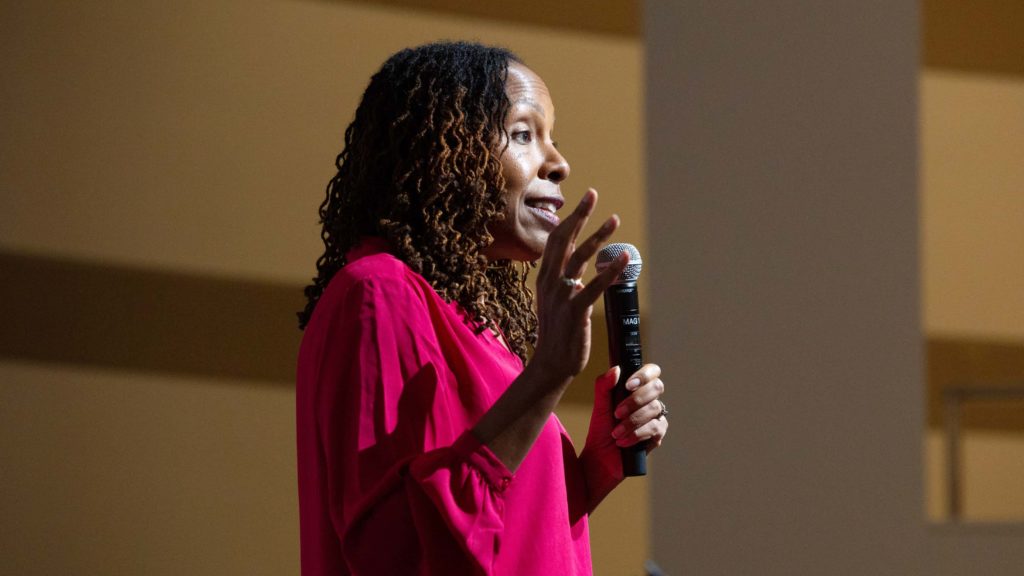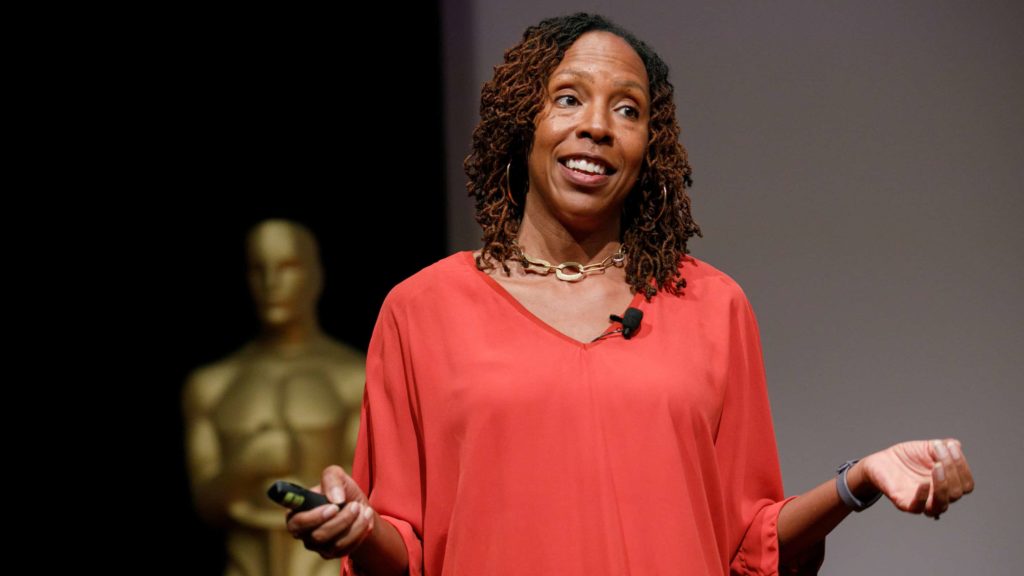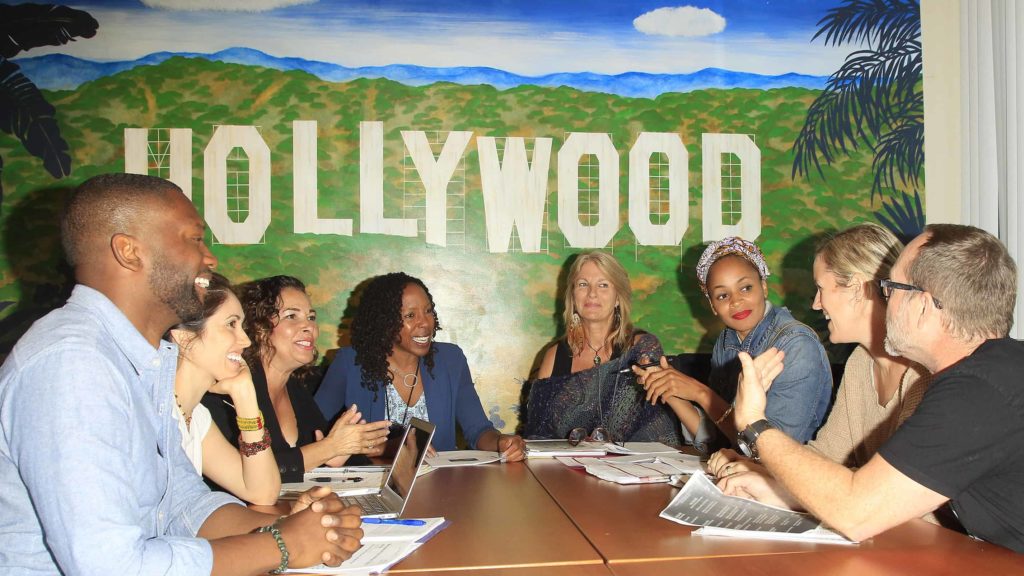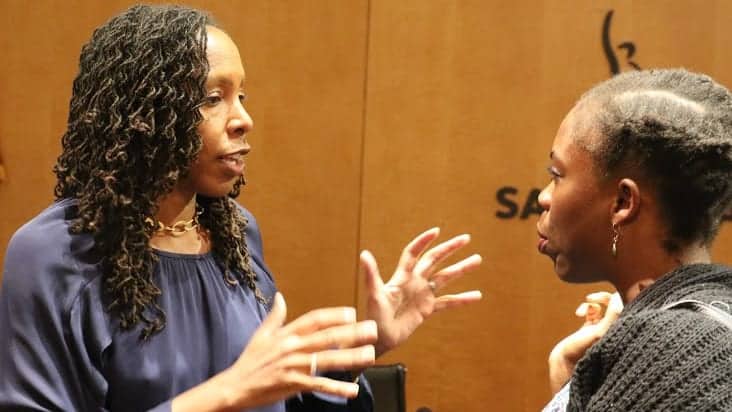A parent may be trying to make the rent or make sure the kids have dinner tonight. A graduate student may come in with $350,000 in student loans and sit next to a longtime professional who got laid off when the pandemic hit. Miata Edoga is helping them to create a sustainable life in an uncertain world. She teaches artists, entrepreneurs, creative people building ways to do the work they love. And in the pandemic, she says, those skills have become vital — for everyone.
For 20 years, she has been helping people of all backgrounds establish a healthier and more compassionate relationship with their money. In her words, it becomes a warm and open relationship, and one anyone can walk into with confidence. The question of resources can be hard to face, she says, especially for people who have not had a steady paycheck to rely on. More and more, she sees people who are creating their own kinds of work and structure, and she has grown a global community to strengthen them.

Miata Edoga, founder of Abundance Bound, speaks at the Art World Conference. Press photo courtesy of Miata Edoga.
In the last two years, she has seen her work extending far beyond the artists she has traditionally served. The pandemic has changed work systems and environments across the country, she says. People facing a financial earthquake are looking for firm ground.
“I feel very passionately that artists have led the way in what it takes to succeed in a new world,” she says, “because — you show me what percent of people now have guaranteed jobs for 40 years with pensions and solid retirement and health benefits.”
She’s been there. Speaking from Boquete, Panama, a town in the highlands on the Caldera River, she reflects on her own path. An actor on stage and film, Edoga is the founder and president of Abundance Bound, a nationally recognized financial education company for creative entrepreneurs. She works with organizations from Columbia University to the California Institute of the Arts — and she serves as the National Financial Wellness Consultant for The Actors Fund, a national organization serving thousands of performers. And she has faced many of the challenges they face.

Miata Edoga, founder of Abundance Bound, gives a presentation for AMPAS. Press photo courtesy of Miata Edoga.
She has grown Abundance Bound out of her own experiences, she says. She is open about her struggles in her early years after college (Williams College class of ’94). In the early 2000s she was in Los Angeles, trying to make a living as an actor: She was working ten jobs, walking dogs and waiting tables — she was on the edge of exhaustion and $80,000 in debt. Her parents had come to this country and worked hard to give her opportunities, she said. Her mother was born in Panama and her father in Nigeria. They had built lives and careers here. She felt a sense of responsibility and an adamant resolve to make a change.
She knew that she knew how to learn, she said; she had the resources of her education. On the West Coast, she found books and mentors, brought her skills and strength to bear and taught herself how to understand what her life cost, and how to build the life she wanted.
Now she leads others facing the same challenges. She has grown Abundance Bound into a diverse community, she said — a place where people can speak honestly about a topic that often comes with deep emotion and fear.
“Our message is, this is a space for exactly where you are,” she says, “and that’s very different from what I encountered when I was trying to get this education for myself in the beginning. I always felt less than. I always felt I wasn’t good enough to have that conversation. … How was I going to tell (the people I teach) about all the debt, and how was I going to tell them I needed help even to figure out where to start?”
Today, she and her team hold that conversation in an empowerment program with digital courses, speakers and Q&A sessions on zoom, podcasts and an online community that people have become part of for years. And now that community stretches around the world.
In the pandemic she has felt the strength of the community she has built.
“2020 has been one of my toughest years,” she says. “… I think it was the first time I fully saw the impact of the work we’re doing — seeing the way these people who had been around, who’d been having this conversation, were negotiating the fear, seeing the way they were negotiating the loss of income — the resilience they brought and the way I saw them rally for each other.”
The pandemic has changed the environments and systems people work with, all across the country, she says, and she sees the skills to create a sustainable life becoming essential — the skills to work freelance, to navigate the gig economy, to thrive in virtual and hybrid work spaces.
“The lives that artists have always had to juggle … these are now lives that thousands and millions of people who have never defined themselves as artists will have to negotiate,” she says. “Creativity and flexibility and forward thinking — these are the times that kind of thinking is so desperately needed.”
She has clients who have spent the pandemic learning new skills, like coding, giving them the ability to work online and to earn in more flexible ways. Ideas of opportunity and work and sustainability are changing, she says. She sees people from many fields in her online community, and she is speaking to a wider range of organizations.
“… It was a very busy time for us,” she says, “and it was also a very heavy time for us, because we were trying to hold a space for so much fear and so much anxiety, and to help people find their way forward.”
‘It’s an important part of who we are — a very safe space for people from all walks of life.’ — Miata Edoga
She affirms that artists and entrepreneurs can learn practical planning, just as a business owner can learn creativity: Success as an artist and financial freedom come together. In one-on-one mentoring and group conversations, she gives people resources to look in detail at their challenges and find new ways to add income, cut expenses, manage debt and change their lives, sometimes gradually, but steadily.
She invites honesty, she says. In Q&A conversations, it excites her when people send her real numbers. People on the call will pull out calculators, she says, and they’ll talk about options and set up a plan. And then new people, seeing how the conversation works, may feel more comfortable in sharing their own challenges.
So it becomes all the more important to make sure everyone in the virtual room feels welcome there, she says. She holds that mission, woven in naturally with the diversity in her community and her team, in their backgrounds and experiences.
“It’s an important part of who we are,” she says, “which is a very safe space for people from all walks of life.”
For each person, she says, her teaching begins with the belief that they can make a change in their lives, and for someone struggling with debt and fear — for someone struggling to eat tonight — that belief can be understandably tough to hold.
“I think it’s so important that we also acknowledge some of the fundamental inequalities in our world, certainly in our country, that became even clearer during the pandemic,” she says, “and that make that belief, for certain groups of people, much harder — because … you don’t see many examples of people like you who are not struggling to pay the bills next week or to get a job with a decent salary.”

Miata Edoga, founder of Abundance Bound, talks with a Financial Wellness Group. Press photo courtesy of Miata Edoga.
She feels a responsibility to be actively reaching people who are not traditionally invited to have these conversations and often don’t have safety nets. If she can help them to find tools, she hopes they can find stability and confidence, to support themselves, and their families, and their work and their communities — and the energy moves outwards.
“That’s why we’re all here,” she says, “to make the difference we’re called to make in the world … And please don’t ever hear me saying it’s easy — but isn’t it a road worth walking?”
I first talked with Miata in two conversations for the Williams College alumni magazine’s website — Miata and I are both alums, a few years apart. A shorter element drawn from that conversation appeared on the alumni website, and this is my story, drawn from Miata’s and my long talks on creative work and community and the changing economy. Thank you, Miata.


